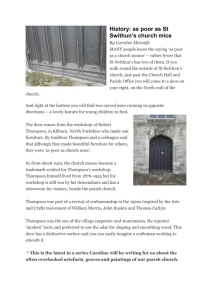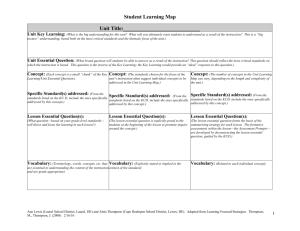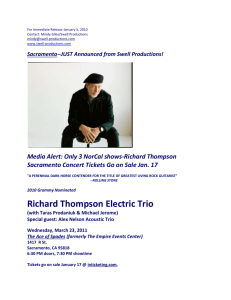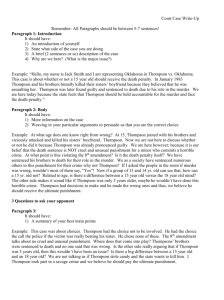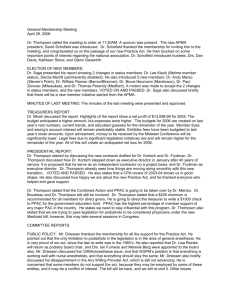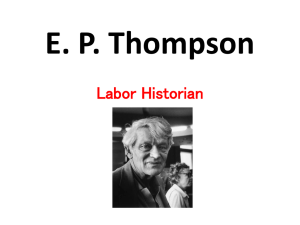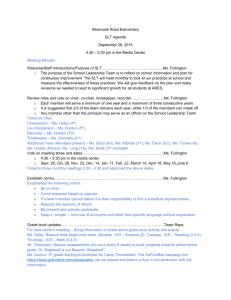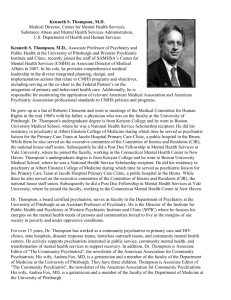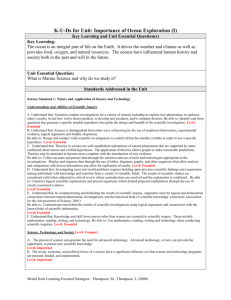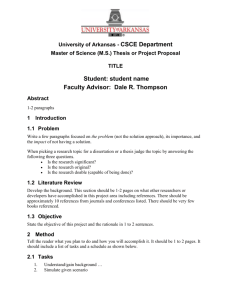Eastern Progress - 28 Mar 1991
advertisement
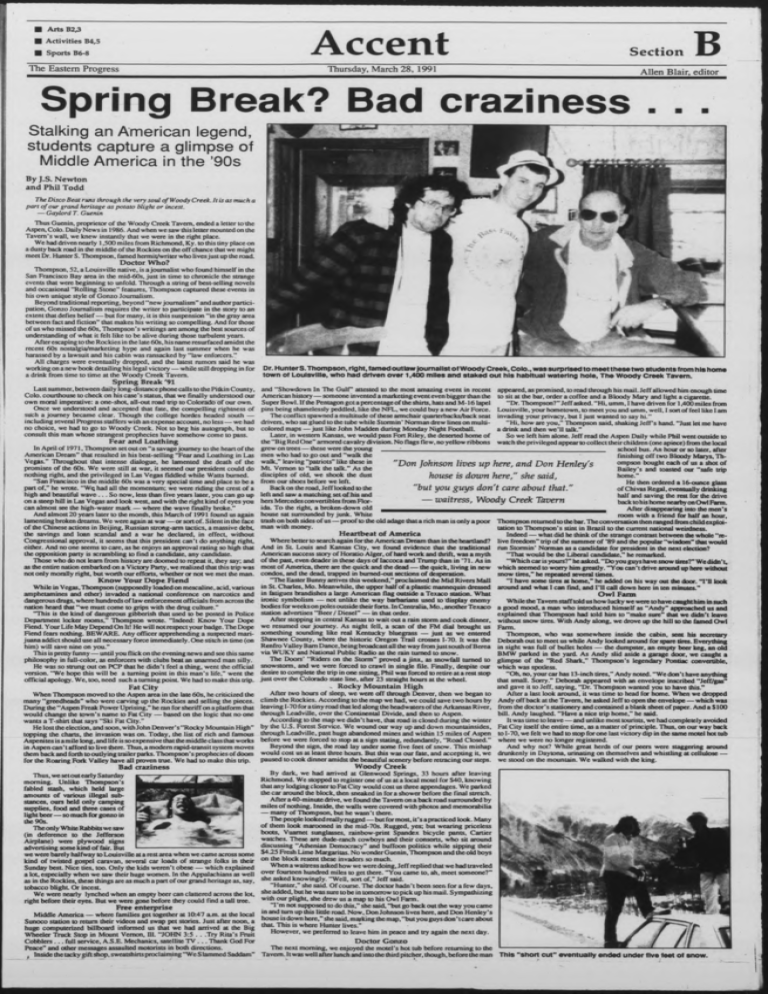
Arts B2,3 Activities B4,5 Sports B6-8 The Eastern Progress Accent Thursday, March 28, 1991 Section 6 Allen Blair, editor Spring Break? Bad craziness Stalking an American legend, students capture a glimpse of Middle America in the '90s By J.S. Newton and Phil Todd The Disco Beat runs through the very soul of Woody Creek. It is as much a part of our grand heritage as potato blight or incest. — Gay lord T. Guenin Thus Guenin, proprietor of the Woody Creek Tavern, ended a letter to the Aspen, Colo. Daily News in 1986. And when we saw this letter mounted on the Tavern's wall, we knew instantly that we were in the right place. We had driven nearly 1,500 miles from Richmond, Ky. to this tiny place on a dusty back road in the middle of the Rockies on the off chance that we might meet Dr. Hunter S. Thompson, famed hermit/writer who lives just up the road. Doctor Who? Thompson, 52, a Louisville native, is a journalist who found himself in the San Francisco Bay area in the mid-60s, just in time to chronicle the strange events that were beginning to unfold. Through a string of best-selling novels and occasional "Rolling Stone" features, Thompson captured these events in his own unique style of Gonzo Journalism. Beyond traditional reporting, beyond "new journalism" and author participation, Gonzo Journalism requires the writer to participate in the story to an extent that defies belief—but for many, it is this suspension "in the gray area between fact and fiction" that makes his writing so compelling. And for those of us who missed the 60s, Thompson's writings are among the best sources of understanding of what it felt like to be alive during those turbulent years. After escaping to the Rockies in the late 60s, his name resurfaced amidst the recent 60s nostalgia/marketing hype and again last summer when he was harassed by a lawsuit and his cabin was ransacked by "law enforcers." All charges were eventually dropped, and the latest rumors said he was working on a new book detailing his legal victory — while still dropping in for a drink from time to time at the Woody Creek Tavern. Spring Break '91 Last summer, between daily long-distance phone calls to the Pitkin County, Colo, courthouse to check on his case's status, that we finally understood our own moral imperative: a one-shot, all-out road trip to Colorado of our own. Once we understood and accepted that fate, the compelling tightness of such a journey became clear. Though the college hordes headed south — including several Progress staffers with an expense account, no less — we had no choice, we had to go to Woody Creek. Not to beg his autograph, but to consult this man whose strangest prophecies have somehow come to pass. Fear and Loathing In April of 1971, Thompson set out on "a savage journey to the heart of the American Dream" that resulted in his best-selling "Fear and Loathing in Las Vegas." Throughout that intense dialogue, he lamented the death of the promises of the 60s. We were still at war, it seemed our president could do nothing right, and the privileged in Las Vegas fiddled while Watts burned. "San Francisco in the middle 60s was a very special time and place to be a part of," he wrote. "We, had all the momentum; we were riding the crest of a high and beautiful wave... So now, less than five years later, you can go up on a steep hill in Las Vegas and look west, and with the right kind of eyes you can almost see the high-water mark — where the wave finally broke." And almost 20 years later to the month, this March of 1991 found us again lamenting broken dreams. We were again at war—or sort of. Silent in the face of the Chinese actions in Beijing, Russian strong-arm tactics, a massive debt, the savings and loan scandal and a war he declared, in effect, without Congressional approval, it seems that this president can't do anything right, either. And no one seems to care, as he enjoys an approval rating so high that the opposition party is scrambling to find a candidate, any candidate. Those who do not learn from history are doomed to repeat it, they say; and as the entire nation embarked on a Victory Party, we realized that this trip was not only morally right, but worth our efforts, whether or not we met the man. Know Your Dope Fiend While in Vegas, Thompson (supposedly loaded on mescaline, acid, various amphetamines and ether) invaded a national conference on narcotics and dangerous drugs, where hundreds of law enforcement officials from across the nation heard that "we must come to grips with the drug culture." "This is the kind of dangerous gibberish that used to be posted in Police Department locker rooms," Thompson wrote. "Indeed: Know Your Dope Fiend. Your Life May Depend On It! He will not respect your badge. The Dope Fiend fears nothing. BEWARE. Any officer apprehending a suspected marijuana addict should use all necessary force immediately. One stitch in time (on him) will save nine on you." This is pretty funny—until you flick on the evening news and see this same philosophy in full-color, as enforcers with clubs beat an unarmed man silly. He was so strung out on PCP that he didn't feel a thing, went the official version. "We hope this will be a turning point in this man's life," went the official apology. We, too, need such a turning point. We had to make this trip. Fat City When Thompson moved to the Aspen area in the late 60s, he criticized the many "greedheads" who were carving up the Rockies and selling the pieces. During the "Aspen Freak Power Uprising," he ran for sheriff on a platform that would change the town's name to Fat City — based on the logic that no one wants a T-shirt that says "Ski Fat City." He lost the election, and soon, with John Denver's "Rocky Mountain High" topping the charts, the invasion was on. Today, the list of rich and famous Aspenites is a mile long, and life is so expensive that the middle class that works in Aspen can't afford to live there. Thus, a modern rapid-transit system moves them back and forth to outlying trailer parks. Thompson's prophecies of doom for the Roaring Fork Valley have all proven true. We had to make this trip. Bad craziness Thus, we set out early Saturday morning. Unlike Thompson's fabled stash, which held large amounts of various illegal substances, ours held only camping supplies, food and three cases of light beer—so much for gonzo in the 90s. The only White Rabbits we saw (in deference to the Jefferson Airplane) were plywood signs advertising some kind of fair. But we were barely halfway to Louisville at a rest area when we came across some kind of twisted gospel caravan, several car loads of strange folks in their Sunday best Nice ties, too. Only the kids weren't obese — which explained a lot, especially when we saw their huge women. In the Appalachians as well as in the Rockies, these things are as much a part of our grand heritage as, say, tobacco blight Or incest. We were nearly lynched when an empty beer can clattered across the lot, right before their eyes. But we were gone before they could find a tall tree. Free enterprise Middle America — where families get together at 10:47 am. at the local Sunoco station to return their videos and swap pet stories. Just after noon, a huge computerized billboard informed us that we had arrived at the Big Wheeler Truck Stop in Mount Vernon. 111. "JOHN 3:5 . . .Try Rita's Fruit Cobblers ... full service. A.S.E. Mechanics, satellite TV ... Thank God For Peace" and other messages assaulted motorists in both directions. , Inside the tacky gift shop, sweatshirts proclaiming "We S lammed Saddam" Dr. Hunter S.Thompson, right, famed outlaw journalist of Woody Creek, Colo., was surprised tomeet these two st udentsfrom his home town of Louisville, who had driven over 1,400 miles and staked out his habitual watering hole, The Woody Creek Tavern. and "Showdown In The Gulf" attested to the most amazing event in recent appeared, as promised, to read through his mail. Jeff allowed him enough time American history — someone invented a marketing event even bigger than the to sit at the bar, order a coffee and a Bloody Mary and light a cigarette. Super Bowl. If the Pentagon got a percentage of the shirts, hats and M-16 lapel "Dr. Thompson?" Jeff asked. "Hi, umm, I have driven for 1,400 miles from pins being shamelessly peddled, like the NFL, we could buy a new Air Force. Louisville, your hometown, to meet you and umm, well, I son of feel like I am The conflict spawned a multitude of these armchair quarterbacks/back seat invading your privacy, but I just wanted to say hi." drivers, who sat glued to the tube while Storm in' Norman drew lines on multi"Hi, how are you," Thompson said, shaking Jeff's hand. "Just let me have colored maps —just like John Madden during Monday Night Football. a drink and then we'll talk." Later, in western Kansas, we would pass Fort Riley, the deserted home of So we left him alone. Jeff read the Aspen Daily while Phil went outside to the "Big Red One" armored cavalry division. No flags flew, no yellow ribbons watch the privileged appear to collect their children (one apiece) from the local grew on trees — these were the young school bus. An hour or so later, after men who had to go out and "walk the finishing off two Bloody Marys, Thwalk," leaving "patriots" like these in ompson bought each of us a shot of 'Don Johnson lives up here, and Don Henley's ML Vemon to "talk the talk." As the Bailey's and toasted our "safe trip disciples of old, we shook the dust home." house is down here," she said, from our shoes before we left. He then ordered a 16-ounce glass Back on the road, Jeff looked to the "but you guys don't care about that." of Chivas Regal, eventually drinking left and saw a matching set of his and half and saving the rest for the drive — waitress, Woody Creek Tavern hers Mercedes convertibles from Florback tohis home nearby on Owl Farm. ida. To the right, a broken-down old After disappearing into the men's mmm——^^m house sat surrounded by junk. While room with a friend for half an hour, trash on both sides of us — proof to the old adage that a rich man is only a poor Thompson returned to the bar. The conversation then ranged from child exploiman with money. tation to Thompson's stint in Brazil to the current national weirdness. Heartbeat of America Indeed — what did he think of the strange contrast between the whole "reWhere better to search again for the American Dream than in the heartland? live freedom" trip of the summer of '89 and the popular "wisdom" that would And in St. Louis and Kansas City, we found evidence that the traditional run Storm in' Norman as a candidate for president in the next election? American success story of Horatio Alger, of hard work and thrift, was a myth "That would be the Liberal candidate," he remarked. of the past, even deader in these days of Iaccoca and Trump than in '71. As in "Which car is yours?" he asked. "Do you guys have snow tires?" We didn't, most of America, there are the quick and the dead — the quick, living in new which seemed to worry him greatly. "You can't drive around up here without condos, and the dead, trapped in burned-out sections of desperation. snow tires," he repeated several times. "The Easter Bunny arrives this weekend," proclaimed the Mid Rivers Mall "I have some tires at home," he added on his way out the door. "I'll look in St. Charles, Mo. Meanwhile, the upper half of a plastic mannequin dressed around and what I can find, and I'll call down here in ten minutes." in fatigues brandishes a large American flag outside a Texaco station. What Owl Farm ironic symbolism — not unlike the way barbarians used to display enemy While the Tavern staff told us how lucky we were to have caught him in such bodies for weeks on poles outside their forts. In Centralia, Mo., another Texaco a good mood, a man who introduced himself as "Andy" approached us and station advertises "Beer / Diesel" — in that order. explained that Thompson had told him to "make sure" that we didn't leave After stopping in central Kansas to wait out a rain storm and cook dinner, without snow tires. With Andy along, we drove up the hill 10 the famed Owl we resumed our journey. As night fell, a scan of the FM dial brought us Farm. something sounding like real Kentucky bluegrass — just as we entered Thompson, who was somewhere inside the cabin, sent his secretary Shawnee County, where the historic Oregon Trail crosses 1-70. It was the Deborah out to meet us while Andy looked around for spare tires. Everything Renfro Valley Bam Dance, being broadcast all the way from just south of Berea in sight was full of bullet holes — the dumpster, an empty beer keg, an old via WUKY and National Public Radio as the rain turned to snow. BMW parked in the yard. As Andy slid aside a garage door, we caught a The Doors' "Riders on the Storm" proved a jinx, as snowfall turned to glimpse of the "Red Shark," Thompson's legendary Pontiac convertible, snowstorm, and we were forced to crawl in single file. Finally, despite our which was spotless. desire to complete the trip in one sitting, Phil was forced to retire at a rest stop "Oh, no, your car has 13-inch tires," Andy noted. "We don't have anything just over the Colorado state line, after 23 straight hours at the wheel. that small. Sorry." Deborah appeared with an envelope inscribed "Jeff/gas" v Rocky Mountain High and gave it to Jeff, saying, "Dr. Thompson wanted you to have this.'' After two hours of sleep, we were off through Denver, then we began to After a last look around, it was time to head for home. When we dropped climb the Rockies. According to the map we had, we could save two hours by Andy off back at the Tavern, he asked Jeff to open the envelope—which was leaving 1-70 for a tiny road that led along the headwaters of the Arkansas River, from the doctor's stationery and contained a blank sheet of paper. And a $ 100 through Leadvilie, over the Continental Divide, and then to Aspen. bill. Andy laughed. "Have a nice trip home," he said. According to the map we didn't have, that road is closed during the winter It was time to lea ve—and unlike most tourists, we had completely avoided by the U.S. Forest Service. We wound our way up and down mountainsides, Fat City itself the entire time, as a matter of principle. Thus, on our way back through Leadville, past huge abandoned mines and within 15 miles of Aspen to 1-70, we felt we had to stop for one last victory dip in the same motel hot tub before we were forced to stop at a sign staling, redundantly, "Road Closed" where we were no longer registered. Beyond the sign, the road lay under some five feet of snow. This mishap And why not? While great herds of our peers were staggering around would cost us at least three hours. But this was our fate, and accepting it, we drunkenly in Daylona, urinating on themselves and whistling at cellulose — paused to cook dinner amidst the beautiful scenery before retracing our steps. we stood on the mountain. We walked with the king. Woody Creek By dark, we had arrived at Glenwood Springs, 33 hours after leaving Richmond. We stopped to register one of us at a local motel for S40, knowing that any lodging closer to Fat City would cost us three appendages. We parked the car around the block, then sneaked in for a shower before the final stretch. After a 40-minute drive, we found the Tavern on a back road surrounded by miles of nothing. Inside, the walls were covered with photos and memorabilia — many of Thompson, but he wasn't there. The people looked really rugged—but for most, it's a practiced look. Many of them look marooned in the mid-70s. Rugged, yes; but wearing priceless boots, Vuamet sunglasses, rainbow-print Spandex bicycle pants, Cartier watches. These are dude-ranch cowboys and their consorts, who sit around discussing "Athenian Democracy" and buffoon politics while sipping their $4.25 Fresh Lime Margaritas. No wonder Guenin, Thompson and the old boys on the block resent these invaders so much. When a waitress asked how we were doing, Jeff replied that we had traveled over fourteen hundred miles to get there. "You came to, ah, meet someone?" she asked knowingly. "Well, sort of," Jeff said. "Hunter," she said. Of course. The doctor hadn't been seen for a few days, she added, but he was sure to be in tomorrow to pick up his mail. Sympathizing with our plight, she drew us a map to his Owl Farm. "I'm not supposed to do this," she said, "but go back out the way you came in and turn up this little road. Now, Don Johnson lives here, and Don Henley's house is down here," she said, marking the map, "but you guys don' t care about that. This is where Hunter lives." However, we preferred to leave him in peace and 07 again the next day. Doctor Gonzo The next morning, we enjoyed die motel's hot tub before returning to the Tavern. It was well after lunch and into the third pitcher, though, before the man This "short cut" eventually ended under five feet of snow.
